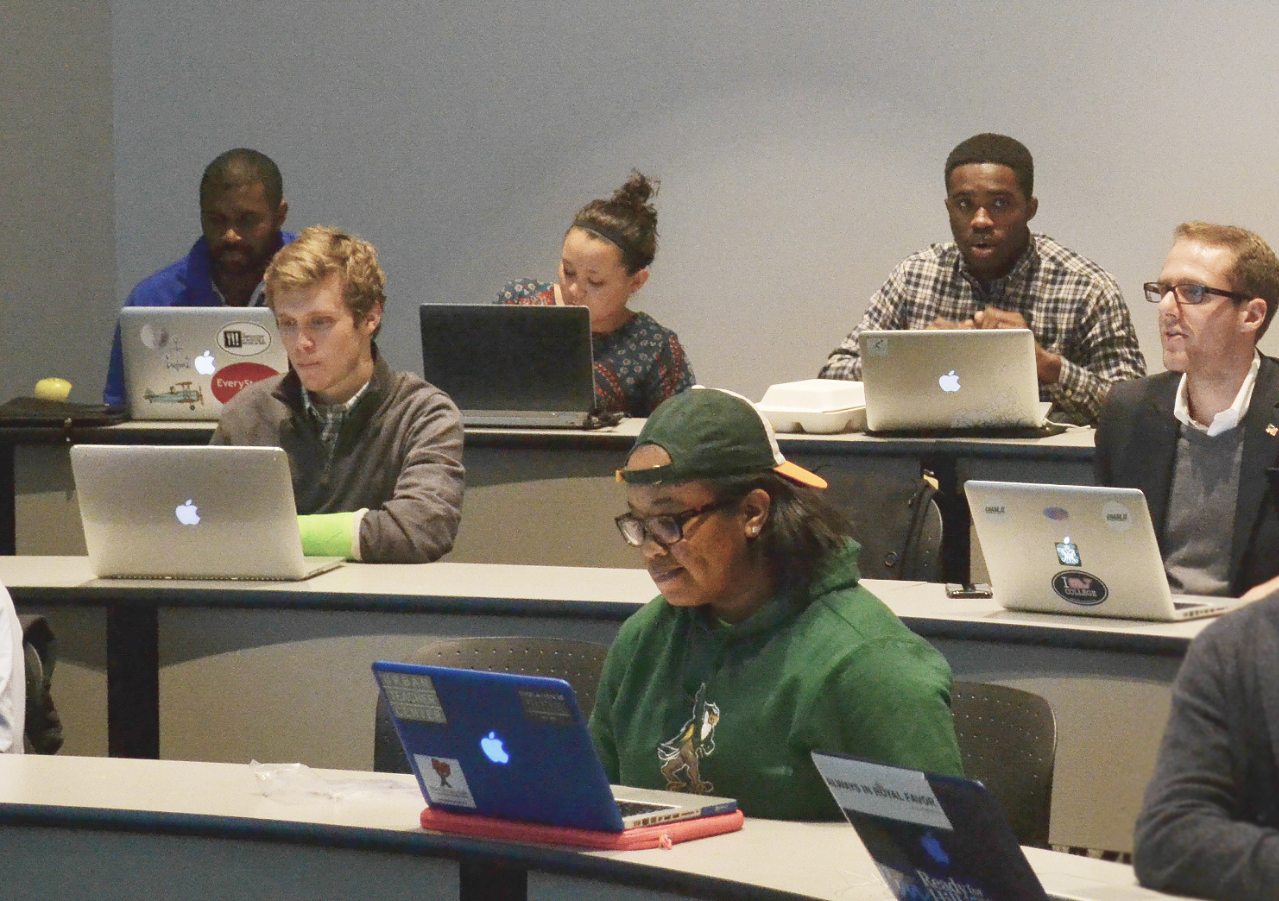In its meeting Tuesday, the Undergraduate Council passed the Constitution Restructuring Act and the Code Restructuring Act in a vote of 12 to 1. Together, these acts dissolve the Undergraduate Council as a branch of the Student Assembly. Both the Graduate Council and the senate must pass the bills for the changes outlined within them to go into effect.
Senators introduced the Constitution Restructuring Act and the Code Restructuring Act in new business at Tuesday’s Senate meeting. The bills will go through the senate’s committee process on Sunday and they will reappear for a vote under old business in next week’s senate meeting.
Chairman of the Undergraduate Council Giorgio Caterini ’17 credited the four class presidents with spearheading the bills. Student Assembly Chief of Staff Drew Wilke ’15 cited Class of 2015 President Joe Foster as the leader of the restructuring movement.
Under the new structure proposed in the two acts, there will be five representatives per class: four senators and one class president. The offices of class vice president, secretary and treasurer will no longer exist.
The class presidents will be given the same responsibilities and voting rights as senators, meaning they will serve on two senate committees and have voting rights in those committees and on the senate floor. However, class presidents will not be allowed to chair committees or the senate. The bills also call for the formation of social class leadership — composed of the four senators and class president — which will meet weekly. In these meetings, class representatives can discuss class events and initiatives.
Wilke said each social class will still maintain its own budget and will likely receive the same amount of funds to work with under the proposed structure.
The merging of the Undergraduate Council into the other branches of the Student Assembly has been a work in progress for several years. In February 2013, the SA Code Revisions Committee and the Undergraduate Council met to discuss a proposal to incorporate the council into the senate in an effort to make the SA more effective.
One month later, the Code Revisions Committee proposed legislation that required class presidents to attend and participate in one or two senate committees and merged the council’s vice president of advocacy and vice president of social affairs positions, shrinking the size of the council. One year later, in February 2014, the senate and the council voted to merge the vice president positions. The Undergraduate Council’s inefficiencies were also the topic of discussion in the first Code Revisions Committee meeting of last semester in November.
Some senators expressed the thought that the Council had lost its purpose.
Wilke explained that other organizations on campus now fill many of the roles the Undergraduate Council once performed.
“Over time, seeing how the campus has shifted and kind of how other organizations have come across campus, the Undergraduate Council has kind of lost an identity over time,” Wilke said.
For example, part of the Undergraduate Council’s purpose is to plan events; however, the SA’s executive branch and AMP fulfill that purpose. The Undergraduate Council also is meant to fundraise, a role that Development Ambassadors have taken on.
Wilke expressed hope that with this restructuring process — because there will be fewer positions in the Student Assembly —elections will become more competitive. In years past, races for positions within the Undergraduate Council among upperclassmen have not been very competitive. Wilke explained that the SA has lost talented representatives who felt unfulfilled within the Undergraduate Council and did not to seek subsequent terms.
“Because really you do have a lot of talented people in Undergraduate Council, people who really care and want to make a difference and they just get frustrated,” Wilke said. “It’s something we’ve been seeing the last couple of years.”
Caterini and Wilke both expressed their belief that these restructuring acts were successfully passed by the Undergraduate Council because the move to restructure came from within the Undergraduate Council and was a collaborative effort.
“It’s really important that [the Undergraduate Council members] feel like this is a change they want to do and its not being imposed on them; it’s something that they have to be comfortable with,” Wilke said. “I think this year we’ve kind of seen that come to fruition.”
The Council spent most of their Tuesday night meeting in closed session, having what Caterini described as an open discussion about the bills.
“[The open discussion of the bills], it’s really a testament to the strength of the bill itself,” Caterini said. “Because I think if there were big problems, it would have been slashed and burned and restarted and instead it stayed as solid as it was when it was first presented — showing how people were really excited and people got together and came up with the right idea.”
Although the Undergraduate Council will no longer exist if the Senate and Graduate Council pass these bills, Wilke explained that the Student Assembly will still maintain the perspective of class representation that the Undergraduate Council ensures.
“We don’t want to lose the idea of class representatives. … We want to make sure with the language that we are writing for this change, when we show this change during information sessions for elections, that everyone’s still responsible for being a class advocate and they are still a representative of their class,” Wilke said. “Because that kind of mindset that Undergraduate Council has is something that we don’t want to lose in the Student Assembly.”
The overall goal in restructuring the SA is to make it a more effective body when it comes to serving students, according to Wilke. Caterini also said he hopes that these changes will benefit the College for years to come.
“I think the result that came out tonight was extremely effective and we will see in five, 10 years down the line this is the way that we will be able to give back to the school more properly,” Caterini said.

